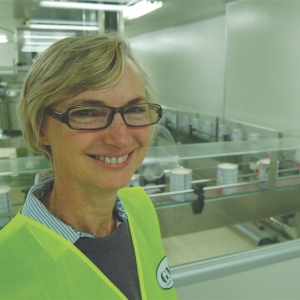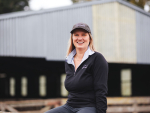The concept, involving capturing and storing closed circuit television camera images and information from various data points and stages of the production line at GMP Dairy in Auckland, impressed auditors from China’s Certification and Accreditation Administration (CNCA). Earlier this month a Chinese television news team visited the company’s factory in East Tamaki to do a story on the black box.
GMP quality assurance manager Nicola Scholes says it’s a simple system to ensure traceability from the moment raw material arrives in the factory to shipment of canned powder to China.
The Chinese auditors found the concept a practical traceability tool for infant formula, Scholes says.
Information is captured in real time by CCTV cameras, sensors, batch readers and x-ray images and other measurement devices along the production line and stored in a server. As a back-up it is also recorded on tapes and stored in a fire-proof vault.
Scholes says if a Chinese consumer has a query about a GMP product, the company can access information from the black box to show when it was produced and what’s inside the can. CCTV images will show the temperature and pressure in the production rooms at the time the can passed through the line.
“We can show you all the CCTV pictures and an x-ray image of what was inside of the can as it passed through the production line,” she told Dairy News.
GMP has operated pharmaceutical plants in Australia and New Zealand for over 20 years and began making infant formula in New Zealand for export four years ago. It holds HACCP and RMP quality systems registration, essential for dairy manufacturing in New Zealand. It also adheres to Good Manufacturing Practice (GMP) standards for the manufacture of infant formula.
GMP Dairy deputy general manager Ravinesh Kumaran says the pharmaceutical mindset is to test raw materials and validate key equipment and processes at every point.
“Pharmaceutical production standards for the production of infant formula products are utilised by GMP Dairy and this was a key success factor in the audit by CNCA.”
Kumaran points out that infant formula is treated as just another dairy product in New Zealand, whereas in China infant formula is seen as a special product, especially after the melamine scandal in 2008.
“Manufacturers have to make sure product is absolutely safe for babies and it is treated as special,” he says.
“Traceability from the raw materials stage, processing, packing in cans, shipping to China and ending up with mothers… manufacturers must make sure they have control over the entire supply chain. That’s what China wants.”
The close association test introduced by the Chinese means manufacturers and brand owners must work together, Kumaran says, with each having control over the other’s processes and fronting up if there’s a food safety breach.
Four CNCA auditors and five MPI officials visited the factory as part of the audit. GMP was informed by MPI that it was the first to be registered by the Chinese Government for the export of infant formula products to China without any corrective actions.
Kumaran says his company feels good to have achieved the accreditation, but it was always confident.
“We are the only infant formula manufacturer practising pharmaceutical standards and that helped us secure the accreditation.”
Eight New Zealand companies – five canning plant operators and three ingredient suppliers – have been accredited by CNCA. A total of 41 manufacturers have been accredited worldwide, with New Zealand having the highest number of accreditations. Australia has two, Netherlands six and France five.
















